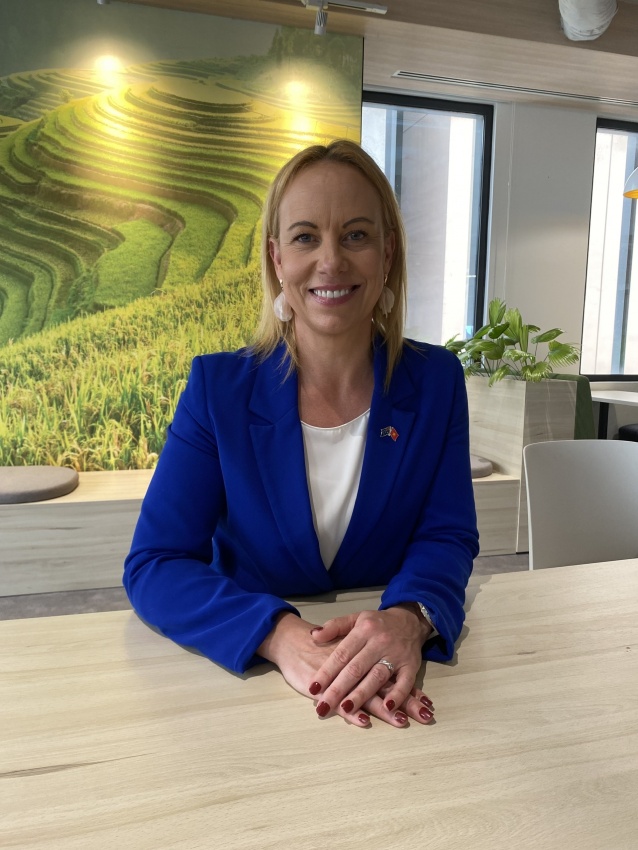 |
| Louise Adams on her business trip to Ho Chi Minh City from November 17-18 |
“Invested: Australia's Southeast Asia Economic Strategy to 2040” is the Australian government's long-term plan to deepen economic engagement with Southeast Asia through trade, investment, and partnerships.
In implementing the strategy in Vietnam, Australian business delegations have been increasing their engagement and building bilateral relationships. In your view, which sectors in Vietnam's economy are leaving the strongest impressions on Australian businesses and investors?
There are four key areas I would highlight: digital technology and skills, food and agriculture, tertiary education, and decarbonisation and energy transition.
Vietnamese enterprises hold a range of capabilities that are highly attractive to Australian investors.
In digital technology and skills, Vietnam has a young population and has made strong, sustained investments in education. Over time, this has produced a deep pool of digital talent that is increasingly recognized internationally.
In agriculture, both countries share a strong agricultural base and face similar challenges, particularly in building resilience to climate change. This creates natural opportunities for collaboration between our businesses and governments.
In education, Australia has a long tradition of providing high-quality tertiary education to students not only from Vietnam but across Southeast Asia. We want to continue delivering that, while also helping Vietnam strengthen its higher education capacity, whether in institutional design, system structure, or governance.
How do you think Australia can best support Vietnam, and Ho Chi Minh City in particular, so that both countries can achieve their goals under long-term investment strategies?
We should continue building on what is already working, leveraging the priority areas identified under the Invested Strategy, especially here in Ho Chi Minh City.
From the business side, we should celebrate and advocate for success stories that demonstrate what Australia-Vietnam collaboration can achieve. Raising awareness in Australia about these examples is crucial.
From the government side, both countries have created an unprecedented opportunity to pave the way for deeper engagement. By removing barriers and facilitating easier, more predictable conditions for business, we can help expand trade and investment significantly. I am very optimistic about how Australia and Vietnam can work together to secure long-term, shared prosperity.
In your view, what distinctive role can Australia play in supporting Vietnam’s development in areas such as infrastructure, urban development, and innovation?
Australia and Vietnam share a long-standing relationship and strong cultural understanding. As Vietnam continues to grow, and as cities like Ho Chi Minh City rapidly expand, Australia can help build capability in urban planning, regulation, and strategic development processes.
This includes strengthening planning systems for infrastructure, land use, transport, and all the challenges associated with rapid urbanisation. From an infrastructure investment perspective, we can support Vietnam in establishing the governance and planning rigor needed to manage growth sustainably and effectively.
What should Vietnam do to attract greater interest from Australian businesses?
One challenge I have observed is the lack of awareness in Australia about the capabilities of modern Vietnamese businesses. Outdated perceptions still exist.
There is a major opportunity for Vietnamese companies to engage directly with Australian businesses and demonstrate the significant progress that has been made. For instance, Vietnam’s digital skills and engineering capabilities are world-class, yet many Australian businesses are simply unaware of how strong this talent pool is.
Raising awareness of these advancements, building relationships, and empowering advocates, like myself in the role of Australia’s Business Champion, to promote these success stories will be key to unlocking further investment and partnership opportunities.
Based on current developments, how do you envision Vietnam in 2045? And what do you foresee for the future of economic and trade relations between Vietnam and Australia by that time?
Vietnam is making significant, forward-looking investments today to build a future-ready nation that can play a strong role not only in Asia and Southeast Asia, but also on the global stage. These efforts, combined with Vietnam’s young and dynamic population, give me great confidence. By 2045, I believe we will look back and see a Vietnam that has truly come into its own as a regional leader and an influential global player.
As for Australia-Vietnam relations, our future prosperity is closely intertwined because of our geographic proximity and shared strategic interests, especially in an increasingly uncertain world. I am truly excited for Australia to be part of Vietnam's growth story in the decades ahead.
















































